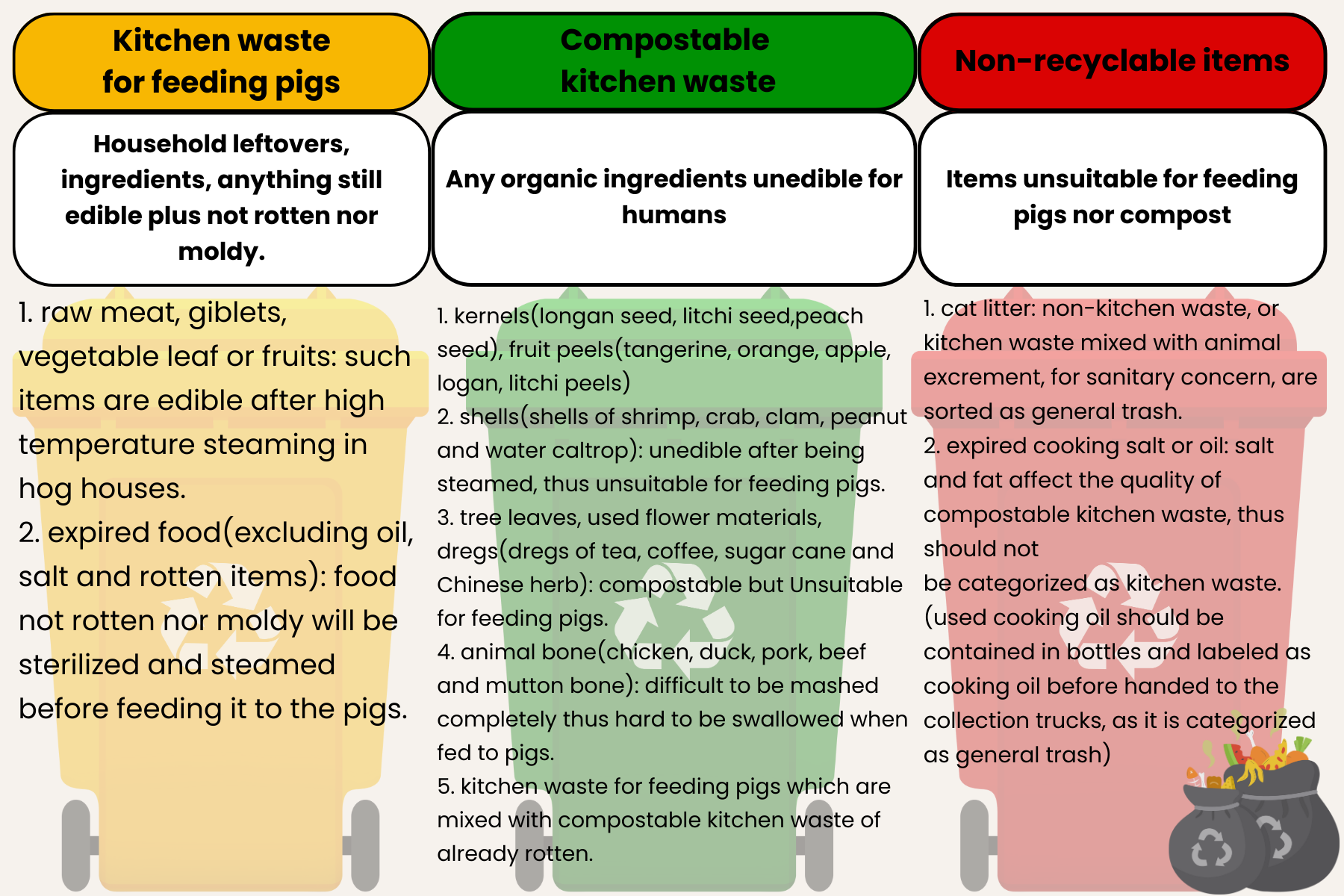How to Dispose of Kitchen Waste? 如何處理廚餘?
Taipei has a system for separating organic kitchen waste, which is divided into:
1. edible scraps for pig feed, such as leftover food.
2. inedible organics for composting, including fruit peels, leaves, bones, flowers, and uncooked vegetables.
For apartments with a management team and designated disposal area, simply separate kitchen waste from recyclables and other trash. Otherwise:
1. Fully participate in recycling kitchen scraps.
2. Separate scraps into "compost" and "pig feed" categories.
3. Edible scraps go to pig feed, inedible to compost.
4. Collection times and locations for kitchen scraps are the same as regular trash.
5. Do not mix in trash or other materials with kitchen scraps; fines for violations range from NT$1,200 to NT$6,000.
6. Drain scraps before recycling, use containers like bins, and sort them into "pig feed" and "compost" when the garbage truck arrives.
7. If using plastic bags, empty the contents for recycling and dispose of the dirty bags in the garbage truck or bins.

除了要求對可回收物和垃圾進行分類之外,台北還實施了一套有機廚房廢物分離系統。目前,廚房廢物分為兩種類型:食物殘渣,經過巴氏殺菌處理後供應給豬隻,以及不可食用的有機材料,用於堆肥。堆肥材料包括水果皮、葉子、骨頭、花朵、未煮過的蔬菜和根部。
儘管目前將廚房殘渣歸類為豬飼料,但政府對餐桌上的食物殘渣中可能存在的有害細菌擔憂,認為這些細菌可能傳播疾病給豬隻。雖然尚未發生這種情況,但政府逐漸計劃加強堆肥的重要性,並要求減少廚房廢物的單獨分類為豬食。
在那之前,台北市居民應繼續分離他們的廚房廢物,將食物殘渣放入垃圾車後部的紅色垃圾桶中,將堆肥材料放入同一輛車上的藍色垃圾桶中,當他們把它們帶到外面時。
1.臺北市已全面回收家戶廚餘,請大家配合分類回收。
2.家戶廚餘請分為「堆肥(非養豬)廚餘」及「養豬廚餘」兩類排出回收。
3.豬可以吃的放養豬廚餘,不能吃的放堆肥(非養豬)廚餘。
4.家戶廚餘回收的時間、地點與平常垃圾收運時間、地點相同。
5.回收家戶廚餘,請勿將垃圾與雜物混入廚餘內。違反者將可依規定處新台幣1,200~6,000元罰款。
6.回收廚餘請先瀝乾水份,並儘量使用廚餘桶等容器盛裝,垃圾車到達時依分類倒入「養豬廚餘」及「堆肥(非養豬)廚餘」桶內回收。
7.如使用塑膠袋盛裝廚餘,請倒出廚餘回收後,髒污塑膠袋可丟入垃圾車或收集桶。
依照臺北市政府環境保護局網站提供資訊:
家戶廚餘分類表
本市家戶配合廚餘回收,請依「煮熟後豬可以吃」歸類為「養豬廚餘」之分類原則辦理,如需進一步分類可以參考下表辦理:

1.回收廚餘請除去外部包裝,並請勿將筷子、湯匙、牙籤、紙巾等雜物及非廚餘垃圾混入廚餘中。
2.椰子殼、榴槤殼本局回收後尚需另行破碎處理,請另行裝袋交回收車免費清運回收,勿與廚餘及垃圾混雜。
3.若對廚餘回收及分類有不清楚,請電洽專線 2720-8889 分機 7291。
依著作權法第十及八十八條,本網站內容未經上品房屋同意請不得轉載
